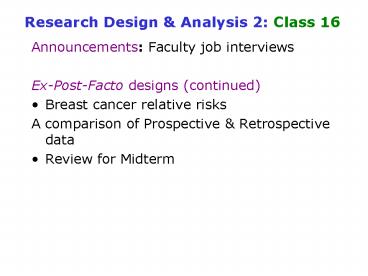Research Design - PowerPoint PPT Presentation
1 / 30
Title:
Research Design
Description:
Learning History Origins of Anxiety Sensitivity. Monday, ... Since 1970's Dr. Katherine Dalton - supports progesterone therapy. estimates of prevalence 6-95 ... – PowerPoint PPT presentation
Number of Views:19
Avg rating:3.0/5.0
Title: Research Design
1
Research Design Analysis 2 Class 16
- Announcements Faculty job interviews
- Ex-Post-Facto designs (continued)
- Breast cancer relative risks
- A comparison of Prospective Retrospective data
- Review for Midterm
2
Colloquium Series Job Candidate
- Margo Watt
- St. Francis Xavier
- Learning History Origins of Anxiety Sensitivity
- Monday, March 13, 2000, 330 p.m.
- HSH 202
3
Lifetime Risks of Developing Breast Cancer (US
study published in Science 93)
4
Top 10 Womens Cancers
5
Incidence of Breast Cancer by Stage
6
Incident Mortality Rate Trends
7
(No Transcript)
8
penny
9
Relative Risk Ratios for Breast Cancer
relative risk gt4 relative risk of 2-
4 relative risk of 1.1-1.9
10
Putting risk of Breast Cancer in Perspective
- One woman in 9 in whom breast cancer will
develop, has a 50 chance of receiving the
diagnosis after age 65 and a 60 chance of
surviving that cancer and dying of other causes - Risk of breast cancer in any given decade never
exceeds 1 in 34 (at 30 is 1 in 250) - Based on editorial in NEJM
11
(No Transcript)
12
Cyclic Moods?
- How many believe their moods vary with
- Days of the week?
- Lunar cycle?
- Menstrual cycle?
- How would you study this?
13
- Raging female hormones in the courts
- Macleans, June 15, 1981
- Treatment for PMS ordered as stabber put on
probation - Globe and Mail, Feb 10, 1987
- Womens violence blamed on period
- Toronto Star, August 25th 1978
- Womans syndrome brings leniency
- Vancouver Sun, February 10th, 1987
14
Politics of PMS
- 1929 term premenstrual tension Dr. Robert Frank
- Since 1970s Dr. Katherine Dalton - supports
progesterone therapy - estimates of prevalence 6-95
- 150 somatic and psychological symptoms associated
with PMS - According to some, PMS is a social and political
construct
15
Hormonal Changes Over Menstrual Cycle
16
Premenstrual Dysphoric Disorder Criteria
- A At least five of the following, present during
last week of luteal phase, remit within days of
follicular phase onset and absent week postmenses - (1) markedly depressed mood, feelings of
hopelessness. or self deprecating thoughts - (2) marked anxiety, tension, feelings of being
"keyed up.' or "on edge" - (3) marked affective lability, (e.g.. feeling
suddenly sad or tearful or increased sensitivity
to rejection) - (4) persistent and marked anger or irritability
or increased interpersonal conflicts - (5) decreased interest in usual activities (e.g.,
work, school, friends, hobbies) - from DSM IV
17
Premenstrual Dysphoric Disorder Criteria
- Continued
- (6) subjective sense of difficulty in
concentrating - (7) lethargy, easy fatigability or marked lack of
energy - (8)marked change in appetite, overeating, or
specific food cravings - (9) hypersomnia or insomnia
- (10) a subjective sense of being overwhelmed or
out of control - (11) other physical symptoms, such as breast
tenderness or swelling, headaches, joint or
muscle pain, a sensation of "bloating," Weight
gain - from DSM IV
18
Premenstrual Dysphoric Disorder Criteria
19
Comparing Retrospective and Prospective
DataMood FluctuationsWomen versus men and
menstrual versus other cyclesJessica McFarland,
et. al.
20
McFarland et.al.
- Methodological problems with existing literature
- demand characteristics (expectations of
participants, bias, volunteers) - Measured negative moods (truncated range)
- Retrospective reports
- No control groups
- No assessment of normal range of moods
21
McFarland et.al.
- Data suggest menstrual cycle related mood effects
are not an issue, yet the belief is there - Why?
- The methodological flaws mentioned
- Women believe they have menstrual mood
fluctuations when they do not. - Two questions of interest
- Do women have classic cyclic mood fluctuation?
- Are womens moods more labile than mens
22
McFarland et.al.
- Methods
- Studies both prospectively and retrospectively
- Participants blind to purpose
- Recorded moods for 70n days (at least 2 cycles)
- 3 groups 1) normally cycling women, 2) women on
O.C.s and 3) men
23
Mood grid
24
Mood Pleasantness
Women NC
Women OC
Men
25
Arousal Levelswomen only concurrent vs.
retrospective reports
26
Mood Pleasantnesswomen only concurrent vs.
retrospective reports
27
Mood Pleasantness Ratings by days of the Week
28
Data on Prevalence of PMS Symptoms
- In surveys, most women report being more
emotional premenstrually - With prospective studies, most women do not show
any relationship between mood and time of month - Of those who report PMS symptoms, only 50
actually have these mood fluctuations - Significant positive correlation between a
womans belief in PMS prevalence and the extent
of her retrospective bias.
29
Midterm Review
- Factorial Experiments Advantages
- Factorial designs terminology
- levels IV1 x levels IV2 x etc.
- Interpreting data from factorial experiments and
experiments with three or more levels of one
(ANOVA outputs from data) - Ex-post-facto designs prospective and
retrospective designs - advantages disadvantages - Problems Partial solutions
30
Midterm Review
- DVs used in Ex-post-facto studies
- Time-series designs, small-n designs
- A-B studies (e.g., homicides after prize fights,
JFKs assassination etc.) - multiple baseline designs
- non-equivalent control group
- replication within- and between-subjects
- reliability and generalizability
- Assessing external and ecological validity
- Volunteers































